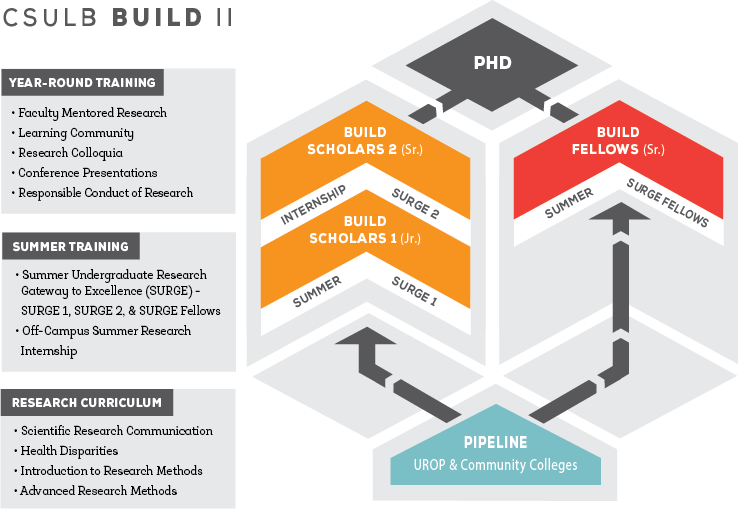BUILD Student Training
The CSULB BUILD Program offers intensive research training for undergraduate students interested in exploring careers in health-related research from the Colleges of Engineering, Health and Human Services, Liberal Arts and Natural Sciences and Mathematics.
The program involves participation in hands-on faculty-mentored research training, enrollment in BUILD courses, a 1 unit Learning Community Seminar each academic semester, as well as other training activities. There are two tracks: BUILD Scholars for students in their junior and senior years, and BUILD Fellows for students in their final senior year. Email us at BUILD@csulb.edu if you have a question about BUILD student training.
BUILD Scholars Program
If you have three to four semesters left to finish your degree program (i.e., expected graduation in December 2026 or May 2027), you can apply to the Scholars Program that begins in June 2025 and ends in May 2027. See the overview of BUILD Scholars Program for more information.
BUILD Fellows Program
If you have research experience and one to two more semesters left to finish your degree program (i.e., expected graduation in December 2025 or May 2026), you can apply to the Fellows Program that begins in June 2025 and ends in May 2026. You will need to apply for graduate school during Fall 2025. See the overview of BUILD Fellows Program for more information.
CSULB BUILD II Program at a Glance

Eligibility
Students need to be a US Citizen, legal permanent resident, or DACA recipient interested in pursuing a Ph.D. and a career in health-related research. Students will need to be a CSULB undergraduate student during the entirety of their time with the program and have 1 - 2 semesters (Fellows) or 3 - 4 semesters (Scholars) remaining before graduation as of June. All qualified applicants are considered and we strongly encourage applications from students from groups traditionally underrepresented in the health-related research workforce, such as first-generation college students, those with financial need, members of racial/ethnic minority groups, students with a disability, and students who have encountered life experiences or challenges that can contribute to the diverse perspectives needed in health-related research.





